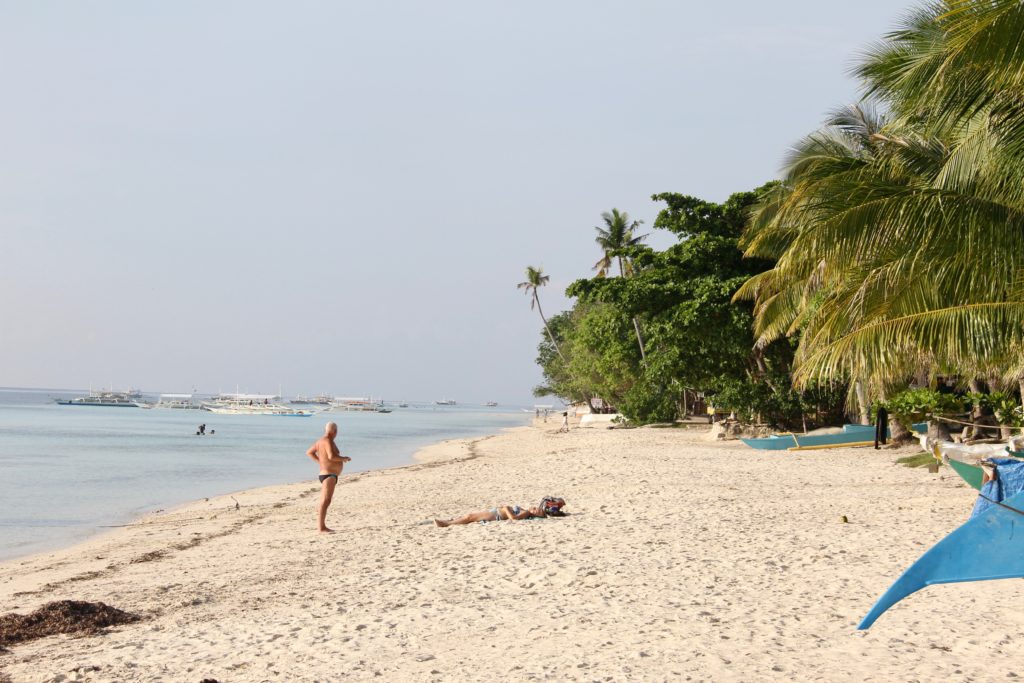
Tourists flock to Bohol’s white sand beaches such as this one in Panglao Island, and other top eco-tourism destinations found in the island province. |CDN Digital file photo
CEBU CITY, Philippines — Due to quarantine restrictions and border closures, Central Visayas lost the opportunity to earn over US$ 700 million from foreign tourist arrivals, local economists said.
The National Economic and Development Authority in Central Visayas (NEDA – 7) reported this computation during a virtual press conference on Thursday, August 20 with the regional bureau of the Philippine Information Agency (PIA – 7).
“One of the largest sectors of Central Visayas is our tourism industry. And the tourism industry, as we all know, is one of our major economic drivers,” said Efren Carreon, NEDA – 7 director.
Carreon said they calculated that Central Visayas’ foregone income from the tourism industry has reached US$ 249 million (roughly P12.5 billion) during the first three months of 2020.
“This is equivalent to P138 million per day of income, foregone. And we can just imagine what does P138 million in revenue lost could mean,” said Carreon.
But he said the amount of foregone income ballooned up to US$ 464.8 million (roughly P23 billion) in the second quarter this year, citing the expansion of travel bans in nearly all destinations abroad.
“Income foregone for the second quarter became higher because practically, all international tourists were not allowed to come, and the flights have been suspended and cancelled,” explained Carreon.
These developments, he said, amounted to a total foregone income of up to US$ 713 million, or roughly around P35.5 billion, for the first semester of 2020.
If the computation included the impact on domestic tourism, the NEDA-7 top official said the numbers of foregone income could go higher.
Some of the country’s most popular tourist destinations for foreigners are found in Central Visayas such as Panglao island in Bohol, Malapascua island in northern Cebu, to name some.
Last March, the Department of Tourism here (DOT-7) announced that the region welcomed at least 4.3 million foreign tourists in 2019, an increase of around 18 percent over 2018’s figure of 3.634 million.
Korea continues to be the top tourism market for Central Visayas in 2019 with over 1.579 million tourists visiting the island or an increase of 17.49 percent over the 1.344 million in 2018.
China came in second with 762,583, higher by 21 percent over the 621,993 registered in 2018.
The next six spots were occupied by Japan (548,627); United States (275,161); Taiwan (135,126); Australia (78,464); United Kingdom (64,860); and Germany (59,786).
READ MORE: Korea remains top tourist market for Central Visayas in 2019
Sub-sectors
Carreon said they came up with the figures by computing the number of total foreign tourist arrivals with the average amount they spend in a day, and the average days they spend staying here in Central Visayas, with data from the DOT-7.
Their calculation also led them to discover that the four tourism sub-sectors badly hit by the coronavirus crisis were accommodation, restaurants, shopping and retail, and local transport.
Citing their agency’s report, Carreon said establishments catering accommodations to tourists were not able to gain income around US$ 99 million.
They were followed by restaurants (US$ 93 million), shopping and retail (US$ 39 million), and local transport (US$ 17.5 million).
“This amount could have generated a lot of jobs and goods and services. And a lot of people could have benefitted with fresh money coming in from our foreign tourists,” said Carreon./dbs

